aNewDomain.net — I spent a couple of days last week in Yangon, the largest city in Myanmar. Here are some of my impressions of the state of the Internet in this part of the world.
On arrival, my first two stops were Internet cafes. Email was calling and I needed to upload my students’ final grades. The computers here were old tower PCs with small LCD displays. They were running Windows 7. Usage cost fifty cents (US) an hour. The connections were slow — around 100kbps as measured by Speedtest.net. I was able to read my email, but at that speed our campus grade reporting system was unusable.
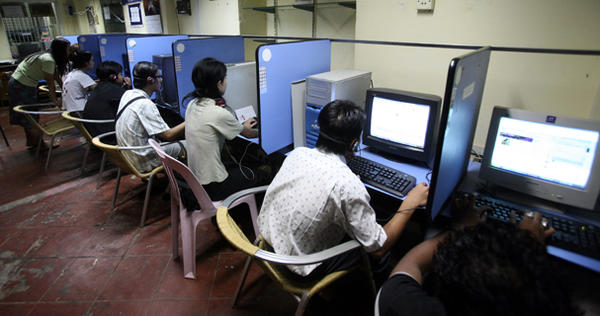
Image credit: Larry Press
As is the case in many developing nations, merchants openly sell pirated software in Myanmar. The labels on the binders in the foreground list the categories of software for sale in a store I visited. Check out the “production department” against the wall behind the table.
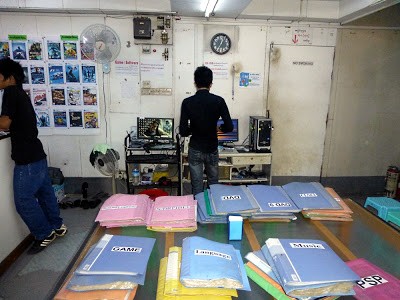
Disks were on display on racks throughout the store. “Installers” — disks with programs — cost $US 1.25 and content disks were on sale for just over 50 cents. The selection was quite random and many of the programs were old versions. Windows 7 was available, for instance, but not Windows 8.
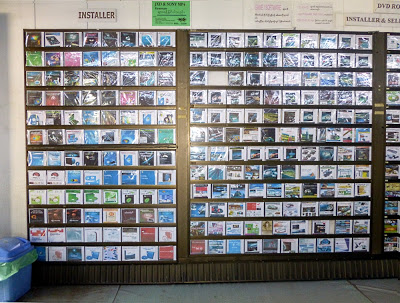
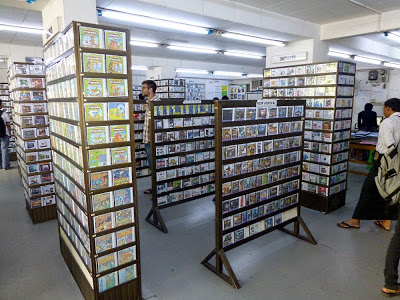
One of the newest looking shops I saw had computers available so customers could buy goods online. This service makes sense in a nation where few people have Internet access and payment and there’s a lack of rapid and efficient delivery systems.

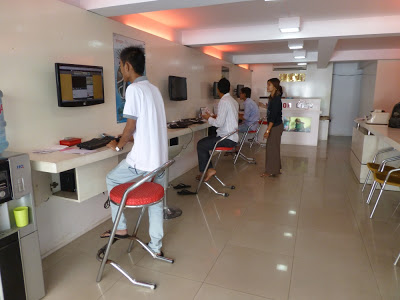
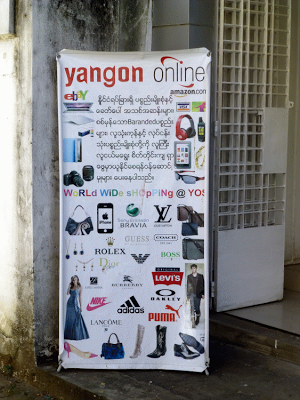
Finally, I saw a shop selling used consumer electronics and computers. It also had a smattering of electronic parts. That reminded me a little of the computer and component swap meets back in the early computer hobby days where I used to hang out as a kid. We used to wirewrap our own boards in those auto junk yards.
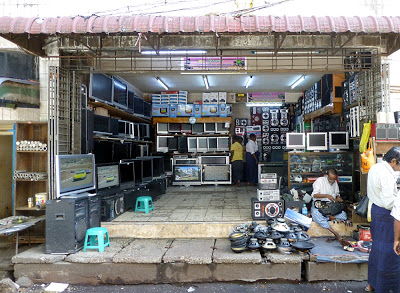
Myanmar has a population of 48.3 million people and a Gross Domestic Product per capita of $US 1,300, making it the second poorest nation in Asia after Nepal (GDP per capita of $US 1,200). Given this level of poverty, it’s not surprising that the Internet has not taken off. The following statistics are comparable to those in a developing nation 15 years ago:
| Internet related statistics, Myanmar 2011 | |
|---|---|
| Percentage of individuals using the Internet | 1.0 |
| Fixed (wired) broadband subscriptions per 100 inhabitants | 0.1 |
| Active mobile broadband subscriptions per 100 inhabitants | 0 |
| Fixed telephone subscriptions per 100 inhabitants | 1.1 |
| Mobile-cellular subscriptions per 100 inhabitants | 2.6 |
| International Internet bandwidth Kbit/s per Internet user | 8.0 |
| Percentage of households with computer | 1.8 |
| Percentage of households with Internet access | 1.4 |
| Secure Internet servers | 4 |
| Internet (.mm) hosts, 2012 | 1,055 |
| ICT development index rank | 131 |
| Sources: CIA, ITU and the World Bank database | |
A very small percent of the population in Myanmar uses the Internet and there is no mobile access. Organization use, as measured by .mm domain names and secure Internet servers, is practically non-existent. The International Telecommunication Union (ITU) ranks Myanmar 131st out of 155 nations using its comprehensive ICT Development Index. (The only Asian nation below Myanmar is Nepal, which is ranked 137th). These statistics explain why my connectivity at Internet cafes in the largest city in the nation was so slow.
That is the bad news. The good news is that Myanmar is rich in natural resources and appears to be stabilizing politically. In 2011, Nobel Peace Prize winner Aung San Suu Kyi was released from house arrest and the country held elections for a minority portion of the Parliament seats. Aung San Suu Kyi’s party, the National League for Democracy, won 43 of 45 seats available in the election, and general elections are scheduled to be held in 2014. In recognition of these changes, both Secretary of State Clinton and President Obama have visited Myanmar.
Let’s hope this apparent progress is for real and the Internet and the nation develop rapidly.












